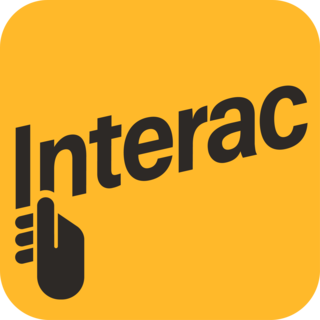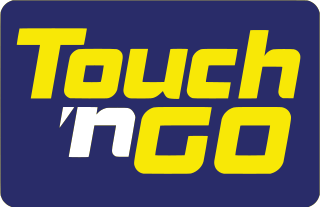
A debit card, also known as a check card or bank card is a payment card that can be used in place of cash to make purchases. The term plastic card includes the above and as an identity document. These are similar to a credit card, but unlike a credit card, the money for the purchase must be in the cardholder's bank account at the time of a purchase and is immediately transferred directly from that account to the merchant's account to pay for the purchase.

Electronic funds transfer at point of sale is an electronic payment system involving electronic funds transfers based on the use of payment cards, such as debit or credit cards, at payment terminals located at points of sale. EFTPOS technology was developed during the 1980s. In Australia and New Zealand, it is also the brand name of a specific system used for such payments; these systems are mainly country-specific and do not interconnect. In Singapore, it is known as NETS.

EMV is a payment method based on a technical standard for smart payment cards and for payment terminals and automated teller machines which can accept them. EMV stands for "Europay, Mastercard, and Visa", the three companies that created the standard.

Interac is a Canadian interbank network that links financial institutions and other enterprises for the purpose of exchanging electronic financial transactions. Interac serves as the Canadian debit card system and the predominant funds transfer network via its e-Transfer service. There are over 59,000 automated teller machines that can be accessed through the Interac network in Canada, and over 450,000 merchant locations accepting Interac debit payments.

The Touch 'n Go smart card is used by Malaysian toll expressway and highway operators as the sole electronic payment system (EPS). The credit card-sized smart card is made of plastic with Philips' MIFARE Classic microchip technology embedded in it. It is a one company monopoly system that you must use this card as long as you need to pass through the highway, take public transportation, etc in Malaysia. The card has an expiry date and inactive period. Check carefully as the Inactive card of not using for more than 12 months, cannot be reactivated.
BancNet is a Philippine-based interbank network connecting the ATM networks of local and offshore banks, and the country's single interbank network in the Philippines in terms of the number of member banks and annual transactions. Due to its status as the country's single ATM switch operator, it is designated by the Bangko Sentral ng Pilipinas (BSP) as the country's national ATM network.
MegaLink is a Philippine-based developer of mobile and banking software as well as a service provider for banks, specifically for automatic teller machine networks and point of sale systems of banks in the country. From its establishment in 1989 until 2015, it pioneered the interconnectivity of several banks in the country by way of being the first interbank network with different banks as its members.

Payment cards are part of a payment system issued by financial institutions, such as a bank, to a customer that enables its owner to access the funds in the customer's designated bank accounts, or through a credit account and make payments by electronic transfer and access automated teller machines (ATMs). Such cards are known by a variety of names including bank cards, ATM cards, client cards, key cards or cash cards.

An ATM card is a payment card or dedicated payment card issued by a financial institution which enables a customer to access their financial accounts via its and others' automated teller machines (ATMs) and to make approved point of purchase retail transactions ATM cards are not credit cards or debit cards. ATM cards are payment card size and style plastic cards with a magnetic stripe and/or a plastic smart card with a chip that contains a unique card number and some security information such as an expiration date or CVVC (CVV). ATM cards are known by a variety of names such as bank card, MAC, client card, key card or cash card, among others. Other payment cards, such as debit cards and credit cards can also function as ATM cards. Charge and proprietary cards cannot be used as ATM cards. The use of a credit card to withdraw cash at an ATM is treated differently to a point of sale transaction, usually attracting interest charges from the date of the cash withdrawal. Interbank networks allow the use of ATM cards at ATMs of private operators and financial institutions other than those of the institution that issued the cards.
An interbank network, also known as an ATM consortium or ATM network, is a computer network that enables ATM cards issued by a financial institution that is a member of the network to be used to perform ATM transactions through ATMs that belong to another member of the network.

Network for Electronic Transfers, colloquially known as NETS, is a Singaporean electronic payment service provider. Founded in 1985, by a consortium of local banks, it aims to establish the debit network and drive the adoption of electronic payments in Singapore. It is owned by DBS Bank, OCBC Bank and United Overseas Bank (UOB).
ATM usage fees are the fees that many banks and interbank networks charge for the use of their automated teller machines (ATMs). In some cases, these fees are assessed solely for non-members of the bank; in other cases, they apply to all users.
The payment card industry (PCI) denotes the debit, credit, prepaid, e-purse, ATM, and POS cards and associated businesses.
The BancNet (BN) Point-Of-Sale System is a local PIN-based electronic funds transfer (EFTPOS) payments solution operated by BancNet on behalf of the member banks and China UnionPay (CUP). The BN point of sale (POS) System allows merchants to accept the automated teller machine (ATM) cards of any active BancNet member bank as payment for goods or services and obliges BN to settle the transaction as early as the following banking day through a direct deposit to a settlement account with any member bank. Acceptance of CUP cards is limited to SM Prime Holdings, Inc.'s Department Store, Supermarket, Hypermarket, Super Sale, Watson's, Sports Central, SM Appliance, Toy Kingdom, and select Surplus Stores.
Discover Financial Services is an American financial services company that owns and operates Discover Bank, an online bank that offers checking and savings accounts, personal loans, home equity loans, student loans and credit cards. It also owns and operates the Discover and Pulse networks, and owns Diners Club International. Discover Card is the third largest credit card brand in the United States, when measured by cards in force, with nearly 50 million cardholders. Discover is currently headquartered in the Chicago suburb of Riverwoods, Illinois.

Citibank Berhad is a licensed commercial bank operating in Malaysia with its headquarters in Jalan Ampang, Kuala Lumpur. Citibank Berhad operates as a subsidiary of Citigroup Holding (Singapore) Private Limited, commencing its banking operations in Malaysia since 1959. Citibank Berhad was locally incorporated in 1994.

girocard is an interbank network and debit card service connecting virtually all German ATMs and banks. It is based on standards and agreements developed by the German Banking Industry Committee.

Multicaixa (MCX) is currently the only brand name for debit cards issued in Angola, and also the only interbank network of automated teller machines and point of sales terminals for electronic payments. While the ATMs and the POS terminals are owned by the supporting bank, the network is operated by EMIS, and the Multicaixa cards of any bank are accepted at the same terms at any Multicaixa ATM or POS terminal. This is regulated by the national law on Angolan payment systems, the BNA directive No. 9/2011 of 13 October on the regulation of bank payment cards, and various other laws and directives regulating the Angolan financial system.
The Four Corners model, often referred to as the Four Party Scheme is the most used card scheme in card payment systems worldwide. This model was introduced in the 1990s. It is a user-friendly card payment system based on an interbank clearing system and economic model established on multilateral interchange fees (MIF) paid between banks or other payment institutions.

Payments Network Malaysia Sdn Bhd (PayNet) is the national payments network and shared central infrastructure for Malaysia’s financial markets. It was formed from the merger between the Malaysian Electronic Payment System (MEPS) and Malaysian Electronic Clearing Corporation Sdn Bhd (MyClear) on 1 August 2017. With the merger, PayNet is now the holding company for the PayNet Group which comprises two main subsidiaries, namely Malaysian Electronic Payment System Sdn Bhd (MEPS) and MEPS Currency Management Sdn Bhd (MCM). The PayNet Group is Malaysia's premier payments network and central infrastructure for financial markets.











